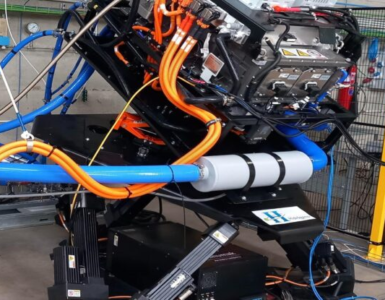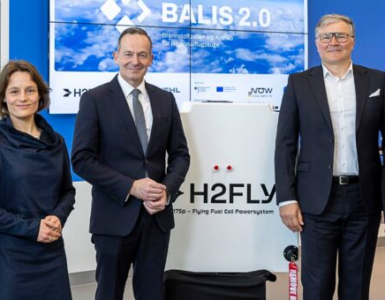Hydrogen- electric aviation leader H2FLY accelerates progress towards zero-emission commercial flight.
H2FLY, the Stuttgart-based developer of hydrogen fuel cell technologies for aircraft, has announced it is another step closer to making zero-emission commercial air travel a reality.
As key players from the global aviation and aerospace industry come together for Farnborough International Airshow (18-22 July), hydrogen-electric aviation company H2FLY has revealed that, in just a few weeks’ time, the company’s revolutionary HY4 aircraft – which is currently operated using pressurized gaseous hydrogen – will be modified to receive a new liquid hydrogen tank, which will double the range capability of the HY4 aircraft.
Following the integration of the new tank and fuel cells, the aircraft is planned to enter a rigorous programme of ground testing early in 2023 and is expected to be the world’s first commercial aircraft to fly using liquid hydrogen.
🔥 What about we co-host a webinar? Let's educate, captivate, and convert the hydrogen economy!
Hydrogen Central is the global go-to online magazine for the hydrogen economy, we can help you host impactful webinars that become a global reference on your topic and are an evergreen source of leads. Click here to request more details
Not only will reaching this milestone enable better range, it will be the first time the team has handled liquid hydrogen on-board. This marks another significant step towards H2FLY’s goal of delivering the world’s first fully hydrogen-electric powertrain, which integrates fuel cells with liquid hydrogen; critical in the pursuit of achieving true zero-emissions medium and long-haul flight.
For more than 10 years, H2FLY has been researching, testing, and refining, resulting in the development of the HY4, a four-seat aircraft with hydrogen-electric propulsion, that first took
flight in 2016. There have been several key milestones across the past two years, including:
- In 2020 H2FLY was granted a permit to fly the latest generation of the HY4 aircraft, which featured a fully redundant powertrain architecture. Across more than 90 takeoffs, the company successfully demonstrated the applicability of hydrogenelectric propulsion solutions in aviation
- In 2021 the company signed a strategic partnership with aircraft manufacturer
Deutsche Aircraft that will see the companies work together to fly a CS25 class
aircraft powered by H2FLY’s hydrogen fuel cell technology. The climate-neutral
regional aircraft, which is expected to fly in 2025, is planned to have a 2,000km
range and seat up to 40 passengers - Earlier this year, the company completed a cross-country flight, from Stuttgart,
Germany to Friedrichshafen, covering 77 miles, marking the first time a hydrogenpowered passenger plane has flown between two commercial airports - Also this year, the company set what is believed to be a world altitude record for a
hydrogen aircraft, flying at 7,230 feet, confirming the company’s position as a leader
in this new category
Prof. Dr. Josef Kallo, co-founder and CEO of H2FLY, commenting on the advantages of hydrogen-electric propulsion, said:
An aircraft that uses liquid hydrogen has the potential to transform the way we travel between cities, regions and countries, delivering true zero-emissions flight on medium and long-haul flights.
“Liquid hydrogen has huge advantages over the alternative pressurised hydrogen gas, not least
because it becomes possible to carry a far greater quantity on board an aircraft. The result is that
significantly longer ranges are possible.”
“At H2Fly we’ve always been focused on delivering and demonstrating new technology, rather
than just talking about it. As we head into this exciting new phase for the company we’re looking
forward to continuing that tradition and proving this important new technology.”
About H2FLY:
H2FLY was founded by five engineers from the German Aerospace Center in Stuttgart and the
University of Ulm, H2FLY GmbH is working to deliver to market the first qualified, fully hydrogenelectric aircraft powertrain. By bringing hydrogen fuel cell technology to the next level, H2FLY will unlock the era of emission-free, sustainable air travel.
The company develops hydrogen-electric propulsion systems for aircraft and is a global leader in the development and testing of such systems. The HY4, the world’s first hydrogen-electric passenger aircraft, first took off in 2016, demonstrating both the feasibility and potential of this technology for the aviation of the future.
H2FLY has a powerful network of partners in industry and science, and is currently working to
accelerate its technology development and commercialization with the support of German and
European partnerships. In just a few years, hydrogen-electric aircraft are expected to be able to
transport 40 passengers over distances of up to 2,000 kilometres (1,240 miles).
Highlights:
- Final preparations are underway to integrate liquid hydrogen tanks into HY4 aircraft, ahead of rigorous programme of ground testing
- Liquid hydrogen will radically boost the range of hydrogen powered aircraft and could make jet fuel obsolete
- H2FLY has been working on CO2-free propulsion systems for more than 10 years
READ the latest news shaping the hydrogen market at Hydrogen Central
Hydrogen- Electric Aviation Leader H2FLY Accelerates Progress Towards Zero-Emission Commercial Flight, Stuttgart, July 20, 2022








